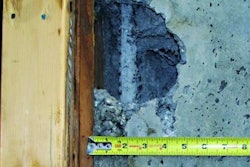
Civil war is breaking out in Oregon's construction industry. The issue is retainage.
That's the system that allows 5 percent of the money due a contractor or subcontractor to be withheld until a job is completed satisfactorily.
Senate Bill 657 would reduce that amount to 1 percent. Some in the construction industry love the idea. Others - with equal passion - do not. Both sides descended on the Senate Business, Transportation and Economic Development Committee earlier this week.
Maurice Rahming, president of O'Neill Electric Inc. in Portland, told senators the system isn't working for him. "As a small contractor, last year alone we had more than $150,000 in retention receivables," he said. "This is income due O'Neill Electric that we have paid taxes on for work we have performed and that we haven't had the ability to access by no fault of our own."
Lowering retainage makes sense in a sour economy, he added.
"Our profit is at best 5 percent of our price. To withhold 5 percent is the same as withholding our profit and overhead on our projects," Rahming added.
Senate Bill 657 is a shrewd investment, he said. "This bill is a stimulus bill without any investment required on the state's behalf."
As Dave Cutz, vice president of finance for Paragon Tile & Stone in Tigard, said, "Sometimes it's just about keeping the doors open."
Tom Gerding, president of T. Gerding Construction Co. in Corvallis, acknowledges that people in the construction industry are hurting. That's why he opposes the bill, he told lawmakers. "While I do not always like retainage, I fully understand and appreciate the role it provides to our industry."
Gerding told committee members he relies on a number of subcontractors. One of them, a rebar installer, shut down his business before a job was completed. "To prevent a lien being filed on the project, I had to pay the union benefits that were due," he said. "Retainage helped cover some, but not all, of the loss."
There have been several occasions when retainage helped cover part of the loss on a project, he added. It didn't cover everything. But he hates to imagine what would have happened without it.
City officials are not keen on the idea of reducing retainage either.
"The reduction of retainage could potentially lead to more legal actions by local governments against contractors to force work to be done correctly, or due to potential legal expense, for local governments to accept work that is incomplete or substandard," testified Brenda Wilson, intergovernmental relations manager for the city of Eugene.
Gerding serves on the executive committee of the Oregon-Columbia chapter of Associated General Contractors. The chapter, as a whole, opposes the bill.
John Rakowitz, the public affairs director for the AGC chapter, said there is simply nothing to replace retainage to protect workers, suppliers, contactors, subcontractors, second-tier subcontractors and a whole delicately woven economic web.
"It serves a purpose," he said after the hearing. "It does not serve one portion of the industry. It serves the entire industry."
Nonetheless, he said, people are scared. "This is a full-blown depression in this industry," he added.
Gerding said the economy is exactly why retainage needs to stay as is. "Today, we are in a super-competitive market," he told lawmakers. "Margins are razor thin, and risk is extremely high. For this reason, maintaining retainage at the 5 percent amount is a minimum and very necessary. A change in the law will bring confusion and uncertainty as different ones try to 'cook up' their new solution to replace the decades-old, tried, proven and transparent function of retainage."
Committee members did not take action on the bill. Additional hearings have not been scheduled yet.



















